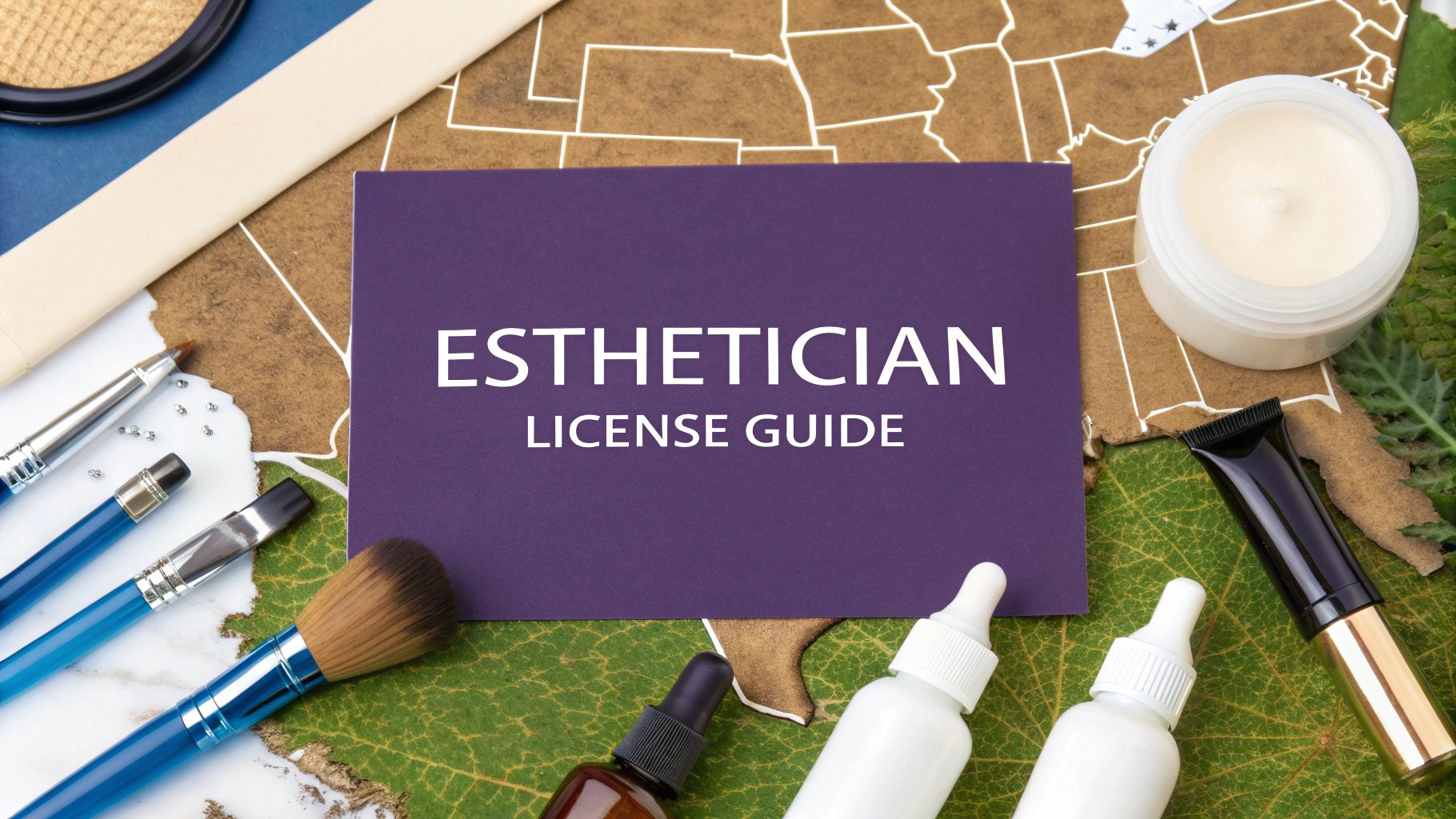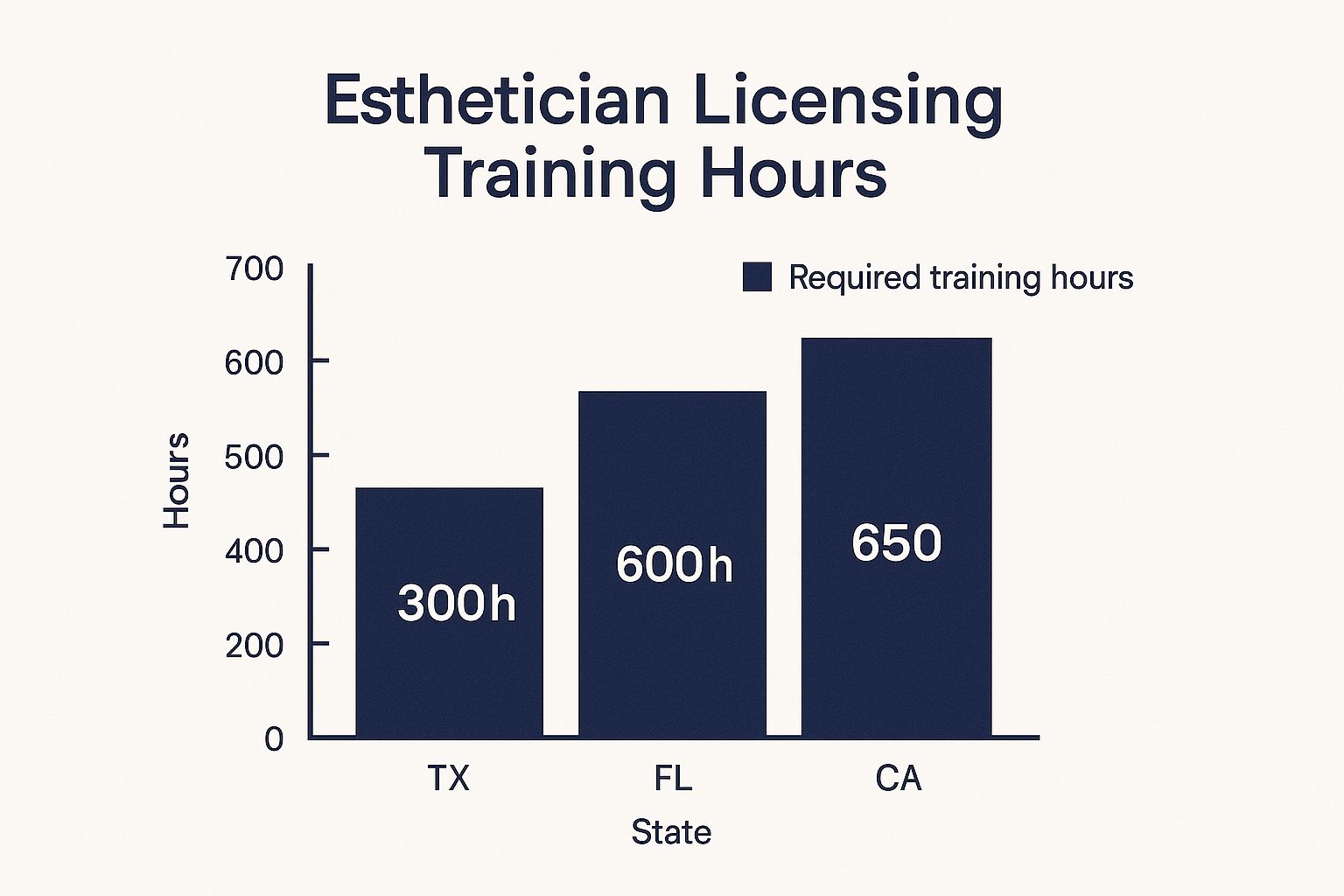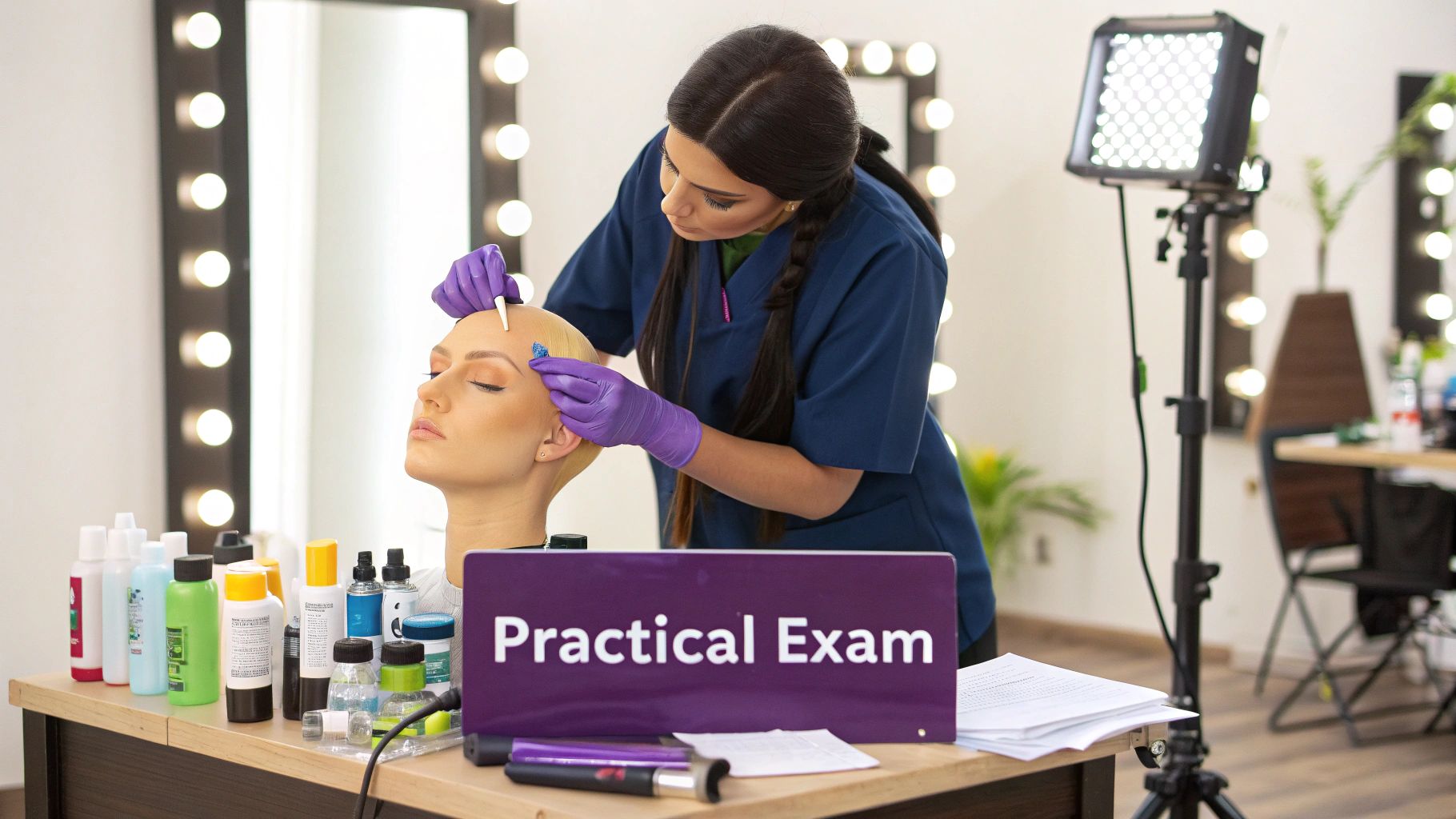A Business Owner’s Guide to Esthetician License Requirements by State

Becoming a licensed esthetician is a rewarding career, but the path isn't the same everywhere. There's no single national standard for licensing, which can create challenges for aspiring professionals and business owners alike. For your business to operate legally and successfully, understanding these state-specific rules is non-negotiable.
The simple truth is that all 50 states require a license, but the steps to get one vary significantly. Training hour requirements alone can range from as low as 300 to over 1,500. This guide provides easy-to-follow instructions and actionable insights to help you navigate the complexities of esthetician licensing across the United States.
Your Guide to Esthetician Licensing Across the US

Securing a valid license is the foundational first step into the professional skincare industry. State boards implement these regulations to protect public health and safety, ensuring every practitioner is thoroughly trained and competent.
For anyone planning to open their own spa or hire a team, mastering these regulations isn't just about compliance; it's a critical component of building a legal, credible, and successful business. Our guide on how to start a beauty business provides a comprehensive roadmap for that journey.
These rules ensure professionals are properly trained in sanitation, skin analysis, and the safe application of treatments. It’s about mastering core skills, like understanding the importance of clean skin for accurate skincare results, which is essential for delivering services that are both safe and effective.
Core Licensing Components to Track
While the specifics differ, nearly every state's licensing process is built on the same pillars. Whether you're a student mapping out your future or a business owner vetting new hires, here are the key components to monitor.
- Required Training Hours: This is the total number of instructional hours required from an accredited school. Some states offer an apprenticeship alternative, which comes with its own set of required hours.
- Examinations: Most states require candidates to pass both a written (theory) exam and a practical (hands-on) exam to demonstrate their knowledge and skills.
- Age and Education Prerequisites: Typically, applicants must be at least 16 or 17 years old and hold a high school diploma or GED.
- Fees and Renewal: Be prepared for initial application and exam fees. Once licensed, you must pay renewal fees every one to two years to keep your license active, sometimes with continuing education requirements.
Quick Reference Chart for State Licensing Rules
Trying to make sense of esthetician license requirements state by state can be overwhelming. To provide actionable insights for aspiring estheticians and spa owners, we've created a quick reference point so you can compare the most important details at a glance.
Use this as your strategic cheat sheet. Whether you're deciding where to attend school, planning a relocation, or hiring new talent, this information gives you a massive advantage. You'll be able to spot the significant differences in state demands quickly and efficiently.
Comparing Training Hour Requirements
The most significant variable is training hours. This number directly impacts the time and financial investment required to get licensed. For business owners, this detail is crucial when planning to open a new location or transfer an existing license.
Take a look at the infographic below. It highlights the stark difference in required hours across just a few states.

The required hours can more than double depending on your location, underscoring why you must research local regulations before making any business decisions.
Understanding these numbers is a critical first step in building a solid business plan. For spa owners, this data influences everything from your hiring timeline to your budget for staff training and development. You can find more practical advice in our guide on how to start a spa business.
Actionable Insight for Business Owners: States with lower hour requirements may offer a larger pool of newly licensed estheticians. Conversely, states with higher hour mandates often produce graduates with more comprehensive initial training, potentially reducing your need for extensive onboarding.
While this chart provides a high-level overview, the detailed state-by-state guides that follow will cover everything from exam providers to renewal fees. Use this chart to identify the states you’re interested in, then dive deep into their specific requirements.
State-by-State Esthetician License Requirements (A-L)

Navigating the esthetician license requirements state by state can seem daunting, but breaking it down alphabetically makes it manageable. Here is a straightforward guide for states from Alabama to Louisiana. Use this as your reference for planning your education, budgeting for fees, and understanding what you’ll need to do to maintain an active license.
One of the first things you'll notice is how wildly different the required training hours are across the country. This can seriously impact your career path and where you decide to go to school. Some states, like Alaska, have requirements as low as 300–350 hours. At the other end of the spectrum, California requires a whopping 1,600 hours of formal education or 3,200 hours for an apprenticeship. States like Delaware and Wisconsin also set the bar high at around 1,550 hours, while places like Alabama, Georgia, and Kansas land in the middle with a 1,000-hour requirement. This big gap between school hours and apprenticeship hours really shows how different states value classroom learning versus hands-on experience.
Whether you're mapping out your career or a business owner verifying a new hire's credentials, use this section as your go-to reference.
Alabama
Alabama sets a high standard, emphasizing extensive hands-on training to ensure every esthetician has a deep, practical understanding of their craft.
- Training Hours: You must complete 1,000 hours of training at a state-licensed school.
- Apprenticeship Option: Alternatively, a 2,000-hour apprenticeship program is available.
- Exams: You must pass both a written theory exam and a practical skills test, both administered by PCS.
- Age and Education: You must be at least 16 years old and have completed the 10th grade.
- Fees: The initial license fee is $40, plus a $150 exam fee.
- Renewal: Licenses must be renewed every two years for $80. No continuing education is required for standard estheticians.
- Reciprocity: Alabama offers reciprocity if your home state's requirements are substantially similar.
Alaska
Alaska’s requirements provide one of the quicker pathways into the profession, but the state still mandates solid professional training and exams to ensure client safety.
For spa owners, this means you might see a faster flow of new talent, but it is a best practice to implement in-house training to get new hires proficient in advanced treatments.
- Training Hours: A minimum of 350 hours from an approved esthetics program is required.
- Apprenticeship Option: An apprenticeship also requires 350 hours of training.
- Exams: You’ll need to pass both written and practical exams.
- Age and Education: Applicants must be at least 17 years old and have a high school diploma or equivalent.
- Fees: Expect to pay around $200 total for the initial license and application.
- Renewal: Licenses are renewed biennially (every two years).
Arizona
Arizona has a unique age requirement, aiming for professionals with more maturity and life experience.
Business Owner Insight: The higher age requirement in Arizona often means your applicant pool includes more mature candidates, many of whom are making a career change. This can be a huge asset, as they often bring enhanced professionalism and client management skills.
The state's Board of Cosmetology is known for its diligence in upholding high standards.
- Training Hours: 600 hours of instruction at a state-licensed school are mandatory.
- Apprenticeship Option: Arizona does not currently offer an apprenticeship path for estheticians.
- Exams: You must pass the NIC National written and practical exams.
- Age and Education: Applicants must be at least 23 years old.
- Fees: Exam fees are approximately $181, with an initial license cost of $40.
- Renewal: Licenses are renewed every two years for a $60 fee, with no continuing education required.
- Reciprocity: Arizona offers licensure by endorsement if your original license is active and in good standing.
Arkansas
Arkansas provides a clear and straightforward path to licensure with a moderate training hour requirement, making it an accessible state for new estheticians.
The requirements align with national standards, which simplifies transferring your license to another state later in your career.
- Training Hours: You’ll need 600 hours from a licensed school.
- Apprenticeship Option: An apprenticeship option is not available.
- Exams: Passing both written and practical exams is mandatory.
- Age and Education: You need to be at least 16 years old and have completed the 10th grade.
- Fees: The examination fee is $125, and the first license costs $50.
- Renewal: Licenses must be renewed every two years on your birthday for a $50 fee.
California
California has some of the most stringent esthetician license requirements in the country, reflecting its large market and strong focus on consumer protection. The advantage is that a California license prepares you for nearly any other state's standards.
- Training Hours: A very significant 1,600 hours of school training is required.
- Apprenticeship Option: Alternatively, you can complete a 3,200-hour apprenticeship.
- Exams: A written exam is required for licensure. The practical exam was recently discontinued.
- Age and Education: You must be at least 17 years old with a 10th-grade education.
- Fees: The initial application and exam fee is $117.
- Renewal: Licenses are renewed every two years for a $50 fee.
- Reciprocity: California does not have direct reciprocity. Out-of-state applicants must prove equivalent training hours and will likely need to pass the state exam.
Colorado
Colorado balances its licensing rules with a reasonable number of training hours and clear exam procedures. The state uses the national NIC exam, which is a significant advantage for license portability.
- Training Hours: 600 hours, measured as 20 credit hours, are required.
- Apprenticeship Option: No formal apprenticeship program is specified.
- Exams: Passing the NIC written and practical exams is mandatory.
- Age and Education: Must be at least 16 years old.
- Fees: The initial license application is $28, with exam fees paid directly to the testing provider.
- Renewal: Licenses expire on April 30th of even-numbered years.
Connecticut
Connecticut is one of the few states that does not require continuing education for renewal, which simplifies long-term license maintenance.
However, the state still mandates a solid educational foundation to ensure every practitioner is competent and safe.
- Training Hours: 600 hours of education are required.
- Apprenticeship Option: Not available for estheticians.
- Exams: You must successfully pass a state-approved exam.
- Age and Education: A high school diploma or equivalent is required.
- Fees: The initial license fee is $100.
- Renewal: Licenses are renewed every year for $105.
Delaware
Delaware's training hour requirements are among the most demanding in the nation, ensuring that estheticians entering the workforce are exceptionally well-prepared.
- Training Hours: A comprehensive 1,500 hours of school training is needed.
- Apprenticeship Option: A 3,000-hour apprenticeship, completed over two years, is an alternative.
- Exams: You must pass the NIC National written and practical exams.
- Age and Education: Applicants need to be at least 16 with a 10th-grade education.
- Renewal: Renew your license by March 31st of every even-numbered year.
Florida
Florida is known for having one of the lowest training hour requirements in the U.S. While this allows for a quick entry into the field, smart business owners should seek candidates who have pursued advanced certifications to differentiate themselves.
- Training Hours: Only 260 hours of training are required.
- Exams: A state-specific theory exam is required.
- Fees: The initial application and license fee is around $75.
- Renewal: You'll need 10 hours of continuing education for your biennial renewal.
Georgia
Georgia requires a significant training commitment, ensuring a high level of expertise among its licensed estheticians.
- Training Hours: A total of 1,000 hours of school training is mandated.
- Apprenticeship Option: A 2,000-hour apprenticeship is available.
- Exams: Passing the NIC written and practical exams is required.
- Age and Education: You must be 17 years old with a high school diploma.
Hawaii
Getting licensed in Hawaii is a straightforward process, focusing on a standard number of training hours and national exams.
- Training Hours: 600 hours of training are required.
- Exams: You must pass the Hawaii State Board written and practical exams.
- Renewal: Licenses are renewed every two years.
Idaho
The Idaho Board of Cosmetology oversees a licensing process that is designed to be clear and accessible.
- Training Hours: 600 hours are required.
- Apprenticeship Option: A 1,200-hour apprenticeship is an alternative route.
- Exams: Passing the NIC exams is necessary.
Illinois
Illinois requires a solid, mid-range number of training hours and makes continuing education a key part of license maintenance, emphasizing ongoing professional development.
- Training Hours: 750 hours from an approved school are required.
- Exams: You must pass a state-administered theory exam.
- Renewal: Plan on 10 hours of continuing education every two years.
Indiana
Indiana’s requirements are very similar to many of its neighboring states, which makes transferring a license a relatively simple process.
- Training Hours: Requires 700 hours of training.
- Exams: You must pass both written and practical exams.
- Renewal: Licenses are renewed every four years.
Iowa
Iowa offers a standard, predictable path to licensure with a strong emphasis on mastering foundational skills.
- Training Hours: 600 hours are necessary.
- Exams: Passing the NIC exams is required.
- Renewal: Requires 8 hours of continuing education biennially.
Kansas
Kansas has one of the higher training hour requirements in the Midwest, ensuring its practitioners have a deep and thorough knowledge base.
- Training Hours: 1,000 hours of training must be completed.
- Exams: You must pass the NIC written and practical exams.
- Age and Education: You have to be at least 17 with a high school diploma.
Kentucky
Kentucky offers flexibility with both a traditional school path and a robust apprenticeship program.
- Training Hours: Choose between 750 hours of school or a 1,500-hour apprenticeship.
- Exams: Requires passing state board exams.
- Renewal: Licenses are renewed annually.
Louisiana
Louisiana's requirements are designed to produce well-rounded estheticians ready to meet diverse client needs.
- Training Hours: A total of 750 hours are required.
- Exams: You must pass the NIC theory and practical exams.
- Fees: Exam fees are about $120, with an initial license fee of $25.
Now, let's continue our state-by-state breakdown of esthetician license requirements, picking up from the middle of the alphabet. The rules shift from one state to the next, so whether you're planning to open a spa in Montana or take your skills to New York, getting the details right is essential.
Before we dive in, remember that training hours are just one component. States also have specific age and education requirements. Many, like Alabama, set the minimum age at 16, while outliers like Arizona require applicants to be 23. Most states also mandate at least a 10th-grade education or a GED. These rules are designed to balance professional standards with public safety. For a deeper look, check out our full guide on becoming a licensed esthetician.
Maine
Maine's Board of Cosmetology and Barbering requires a solid educational foundation to ensure practitioner competence.
- Training Hours: You'll need to complete 600 hours at a licensed esthetics school.
- Apprenticeship Option: A 1,200-hour apprenticeship program is also available.
- Exams: Passing both a written (theory) and a practical (hands-on) exam is required.
- Age and Education: Applicants must be at least 17 years old and have completed the 10th grade.
- Renewal: Licenses must be renewed annually by October 31st.
Maryland
Maryland maintains standard requirements, which is beneficial if you are transferring a license from a state with similar rules.
- Training Hours: A total of 600 hours of education from an approved school is required.
- Apprenticeship Option: You can also opt for a 1,200-hour apprenticeship.
- Exams: You must pass the state board's theory and practical exams.
- Age and Education: Applicants must be at least 17 years old with a 9th-grade education.
Massachusetts
Massachusetts emphasizes formal education with a curriculum designed for a comprehensive understanding of skincare.
- Training Hours: 600 hours of instruction are required.
- Exams: Passing both written and practical state board exams is mandatory.
- Renewal: Licenses are renewed every two years on your birthday.
Michigan
Michigan provides flexibility in training, allowing you to choose between a traditional school program or a more hands-on approach.
- Training Hours: A minimum of 400 hours of training at a state-approved school is needed.
- Apprenticeship Option: Michigan does not offer a specific apprenticeship program for esthetics.
- Exams: Candidates must pass the NIC national theory and practical exams.
- Age and Education: You must be at least 17 years old and have completed the 9th grade.
Business Owner Insight: With a 400-hour requirement, Michigan estheticians can enter the workforce quickly. Smart spa owners can leverage this by investing in advanced in-house training to build specialized skills and service offerings right away.
Minnesota
Minnesota’s Board of Cosmetologist Examiners has a structured path to licensure focused on safety and competency.
- Training Hours: A 600-hour program from a licensed school is mandatory.
- Exams: You must pass three tests: a general theory exam, a written practical exam, and a state law exam.
- Fees: Plan for approximately $195 to cover all exam and initial license fees.
- Renewal: Licenses are renewed every three years, requiring 4 hours of continuing education.
Mississippi
Mississippi holds its estheticians to a high standard with comprehensive training to ensure they are prepared for diverse client needs.
- Training Hours: A 600-hour curriculum is required.
- Exams: You will take the NIC National exams, both written and practical.
- Age and Education: You must have a high school diploma or GED.
Missouri
The licensing process in Missouri is thorough, ensuring every esthetician has a solid grasp of skincare fundamentals and safety protocols.
- Training Hours: You will need 750 hours of training at a licensed school.
- Apprenticeship Option: A 1,500-hour apprenticeship is a recognized alternative.
- Exams: Passing the state board's theory and practical exams is required.
- Fees: The exam fee is $145, and the initial license costs $30.
Montana
Montana keeps the licensing process straightforward with a focus on standard training hours and nationally recognized exams.
- Training Hours: A 650-hour training program is required.
- Exams: Passing the NIC written and practical exams is mandatory.
- Renewal: Licenses are renewed every two years. Independent contractors need 30 hours of continuing education.
Nebraska
Nebraska's Department of Health and Human Services oversees licensing with a strong focus on public health and safety.
- Training Hours: You must complete 600 hours of training.
- Exams: Be prepared for three tests: a state-specific written exam, a practical exam, and a jurisprudence exam on Nebraska's laws.
- Fees: The initial license fee is $95.
Nevada
With its booming beauty market, Nevada’s Cosmetology Board requires a significant educational investment to ensure top-tier practitioners.
- Training Hours: A 900-hour program is required for an esthetician license. An advanced 1,200-hour program is also available.
- Exams: You must pass the NIC National written and practical exams.
- Age and Education: You must be at least 18 years old with a 10th-grade education.
- Renewal: Renewal requires 4 hours of continuing education on infection control.
New Hampshire
New Hampshire offers clear educational paths, allowing you to choose the one that best fits your learning style.
- Training Hours: You can complete 600 hours at a licensed school.
- Apprenticeship Option: Alternatively, you can pursue a 1,200-hour apprenticeship.
- Exams: Both paths require passing theory and practical exams.
New Jersey
New Jersey's State Board of Cosmetology and Hairstyling sets high standards for professionalism and skill.
- Training Hours: A 600-hour curriculum is the standard.
- Exams: You must pass the state's official written and practical exams.
- Age and Education: You must be at least 17 years old and have a high school diploma or equivalent.
New Mexico
New Mexico’s Board of Barbers and Cosmetologists ensures practitioners are well-rounded through a balanced program of theory and hands-on application.
- Training Hours: 600 hours of school training are required.
- Exams: The state uses the NIC National written and practical exams.
- Renewal: Licenses are renewed annually with no continuing education required.
New York
As a major hub for the beauty industry, New York has established rigorous standards to maintain the quality of skincare services.
- Training Hours: A 600-hour training program is required.
- Exams: You must pass both a written and a practical exam administered by the state.
- Fees: The total cost for the application and exams is $55.
- Renewal: Licenses are renewed every four years.
North Carolina
North Carolina focuses on a comprehensive curriculum to ensure licensed estheticians have a strong foundation in both the science and art of skincare.
- Training Hours: You must complete 600 hours of training.
- Exams: The state requires you to pass both theory and practical exams.
- Renewal: You will need 8 hours of continuing education for each annual renewal.
North Dakota
North Dakota offers a clear and direct path to licensure with requirements that align with national standards.
- Training Hours: A 600-hour program is mandatory.
- Exams: The NIC National exams are the standard for licensure.
- Renewal: Licenses are renewed annually on the last day of your birth month.
Ohio
The Ohio State Board of Cosmetology requires a robust training program to prepare estheticians for the professional world.
- Training Hours: You'll need 600 hours of training to qualify for exams.
- Exams: Passing both a written and practical exam is required.
- Renewal: You'll need 8 hours of continuing education for your biennial renewal.
Oklahoma
Oklahoma's requirements are focused on creating competent and safe skincare professionals ready to serve the public.
- Training Hours: A 600-hour program is the standard.
- Exams: Passing written and practical exams is mandatory.
- Age and Education: You need to be at least 16 years old with an 8th-grade education.
Oregon
Oregon stands out with one of the lowest training hour requirements but mandates specific coursework with a strong focus on safety and infection control.
- Training Hours: A minimum of 250 hours is required, along with passing specific course modules.
- Exams: You must pass the Oregon Laws & Rules exam and a board-approved practical exam.
- Renewal: Continuing education is required for renewal.
Pennsylvania
Pennsylvania offers a direct path to licensure with fewer training hours than average, making it an accessible state for new estheticians.
- Training Hours: Only 300 hours of instruction are required.
- Apprenticeship Option: An apprenticeship is an option but requires a special permit from the state board.
- Exams: You must still pass both theory and practical exams.
Rhode Island
Rhode Island maintains high standards with a comprehensive training program and exam process overseen by its Department of Health.
- Training Hours: A 600-hour program is required.
- Exams: You must pass the state's designated written and practical exams.
- Age and Education: You need to be at least 18 years old with a high school diploma.
South Carolina
South Carolina's Board of Cosmetology has a clear educational framework to ensure practitioners are well-prepared.
- Training Hours: You'll need 450 hours of training.
- Exams: Passing the NIC National exams is required to get your license.
- Renewal: No continuing education is required for renewal.
South Dakota
South Dakota’s licensing process is direct, focusing on standard education and nationally recognized exams.
- Training Hours: A 600-hour program must be completed.
- Exams: The NIC National theory and practical exams are mandatory.
- Renewal: Licenses are renewed annually on your birthday.
Tennessee
Tennessee's Board of Cosmetology and Barber Examiners ensures every licensed professional meets a high standard of skill and safety.
- Training Hours: You will need 750 hours of training.
- Exams: Passing both a written and a practical exam is required.
- Age and Education: Applicants must be at least 16 years old.
Texas
With its large market, Texas has one of the higher training hour requirements, reflecting a commitment to thorough education.
- Training Hours: A 750-hour program from a licensed school is the standard.
- Exams: A written and practical exam must be passed.
- Renewal: Plan on completing 4 hours of continuing education for each renewal cycle.
Utah
Utah offers a two-tiered licensing system: a standard Esthetician license and an advanced Master Esthetician license.
- Training Hours: It's 600 hours for a basic Esthetician license. To become a Master Esthetician, you'll need an additional 600 hours (for a total of 1,200).
- Exams: The NIC National exams are required for both license levels.
- Renewal: No continuing education is needed for the basic license.
Vermont
Vermont provides options with a choice between a traditional school path and a hands-on apprenticeship.
- Training Hours: A 600-hour school program is one route.
- Apprenticeship Option: The alternative is a 1,000-hour apprenticeship.
- Exams: Both paths require passing state board examinations.
Virginia
Like Utah, Virginia has a tiered system that allows you to advance your practice to Master Esthetician with additional training.
- Training Hours: It’s 600 hours for a basic license and an additional 600 hours for a Master Esthetician license.
- Exams: You'll need to pass a state-approved theory and practical exam.
- Age and Education: You must have completed the 9th grade.
Washington
Washington also offers a Master Esthetician license for professionals who want to perform more advanced treatments.
- Training Hours: You'll need 750 hours for an Esthetician license and 1,200 hours total for a Master Esthetician license.
- Exams: Both written and practical exams are required for licensure.
- Renewal: Licenses must be renewed every two years.
West Virginia
West Virginia adheres to a standard set of requirements to ensure all its estheticians are qualified and competent.
- Training Hours: 600 hours of training are required.
- Exams: Passing both theory and practical exams is mandatory.
- Renewal: You'll need 4 hours of continuing education every two years.
Wisconsin
Wisconsin’s requirements are straightforward and align with many other states in the Midwest.
- Training Hours: A 450-hour training program is required.
- Exams: You must pass both a written and a practical examination.
- Renewal: This requires 4 hours of continuing education focused on laws and safety.
Wyoming
Wyoming's Board of Cosmetology ensures that every practitioner meets a solid educational and testing standard.
- Training Hours: You must complete 600 hours of instruction.
- Exams: The NIC National written and practical exams are required.
- Age and Education: Applicants need to be at least 16 years old and have completed the 10th grade.
How to Handle License Reciprocity and Endorsement Across State Lines

Relocating your esthetics practice or hiring from another state requires a strategic plan for transferring professional licenses. This process, known as endorsement or reciprocity, allows states to recognize qualifications earned elsewhere.
While often used interchangeably, the terms differ. Reciprocity is a formal agreement between states to accept each other's licenses, which is rare. More commonly, you'll encounter endorsement, where the new state board reviews your credentials to see if they meet their own esthetician license requirements.
What State Boards Really Look For
When you apply for a license by endorsement, the new state board audits your professional background to ensure you meet their minimum standards for safe and effective practice.
Here's their checklist:
- Training Hours: Does your original training meet or exceed the hour requirement of the new state? This is often the most significant factor.
- Work Experience: Some states may allow you to substitute documented work experience to compensate for a minor gap in training hours.
- Exam Records: You must provide official proof of passing both written and practical exams, typically from a provider like the NIC (National-Interstate Council of State Boards of Cosmetology).
- License Status: Your current license must be active and in good standing, free of any disciplinary actions.
Actionable Tip for Business Owners: Before hiring an esthetician from out of state, verify their credentials against your state's endorsement requirements. This proactive step can prevent significant hiring delays and ensure your new team member can get licensed and start working promptly.
A Step-by-Step Guide to a Smooth Transfer
Navigating the license transfer process is all about organization and proactive communication. Follow these steps for a seamless transition.
- Contact the New State Board First. Before taking any other action, contact the cosmetology board in your destination state. Request their "licensure by endorsement" application and a clear checklist of all required documents for out-of-state applicants.
- Gather Your Documentation. Compile your professional portfolio. You will need official transcripts sent directly from your esthetics school, proof of your exam scores, and a verification letter from your current state board confirming your license is active and in good standing.
- Identify and Address Any Gaps. If your training hours fall short of the new state's requirement (e.g., you have 600 hours but they require 750), you will likely need to complete additional schooling. If a different state law exam is required, you must register for and pass it before your application can be approved. Plan for these potential requirements early.
Common Questions About Esthetician Licensing
Navigating esthetician licensing rules can be complex. Here are answers to common questions about relocating, advancing your career, and working as a student.
What Happens When I Move to a New State?
Relocating is a common challenge. If you completed 750 training hours in your home state but your new state requires 1,000, you will most likely need to return to school to make up the difference.
Some state boards may consider documented work experience to close a small gap, but this is handled on a case-by-case basis. Always contact the board directly to confirm their policy.
Advancing Your Esthetician Career
Understanding different license types is crucial for career growth. A standard esthetician license is your foundation for services like facials, waxing, and makeup application. A Master Esthetician license represents a higher level of expertise.
Offered only in a few states like Utah and Virginia, this advanced credential requires 600 or more additional training hours focused on advanced procedures.
- Chemical Peels: Deeper, more potent formulations for significant skin resurfacing.
- Microdermabrasion: Advanced mechanical exfoliation requiring precision and skill.
- Laser Treatments: Medical aesthetics services like laser hair removal and skin rejuvenation.
For business owners, hiring a Master Esthetician allows you to add high-demand, premium services to your menu, significantly boosting your revenue potential.
Can I Work While I'm Still in School?
The answer is an unequivocal no. You cannot legally perform esthetic services for compensation until you hold a valid state license.
Attempting to do so can result in substantial fines and may jeopardize your future eligibility for licensure. It is not worth the risk. Once you are licensed, ensure your business practices are professional from day one. A great place to start is by perfecting your client intake process with our guide on esthetician client consultation forms.
Ready to create a stunning online presence for your beauty business? gohappybeauty offers specialized website builders designed to help estheticians and spa owners attract more clients and grow their brand. Build your professional website today at https://gohappybeauty.com.
Grow your beauty business
Our focus is, and always will be, helping you improve your online presence and generate more business from your website. That is what we do, for you.

